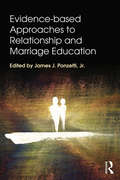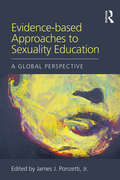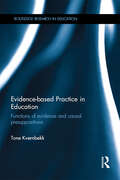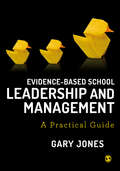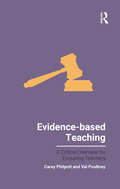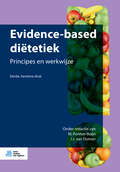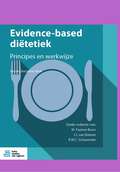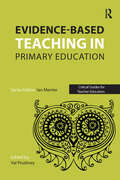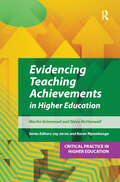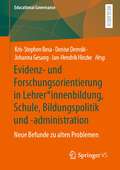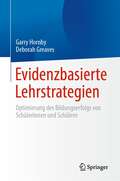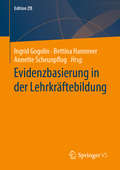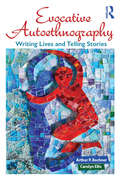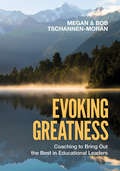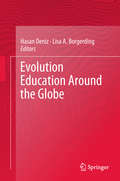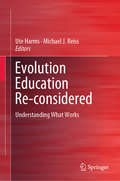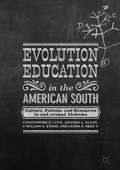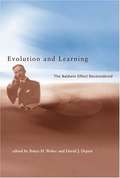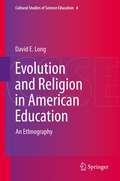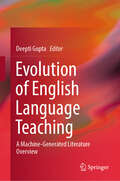- Table View
- List View
Evidence-based Approaches to Relationship and Marriage Education (Textbooks in Family Studies)
by James J. Ponzetti Jr.This is the first book to provide a comprehensive, multidisciplinary overview of evidence-based relationship and marriage education (RME) programs. Readers are introduced to the best practices for designing, implementing, and evaluating effective RME programs to better prepare them to teach clients how to have healthy intimate relationships. Noted contributors from various disciplines examine current programs and best practices, often by the original developers themselves. Readers learn to critically appraise approaches and design and implement effective, evidence-based programs in the future. Examples and discussion questions encourage readers to examine issues and apply what they have learned. The conceptual material in Parts I & II provides critical guidance for practitioners who wish to develop, implement, and evaluate RME programs in various settings. Chapters in Parts III & IV follow a consistent structure so readers can more easily compare programs-- program overview and history, theoretical foundations, needs assessment and target audience, program goals & objectives, curriculum issues, cultural Implications, evidence based research and evaluation, and additional resources. This book reflects what the editor has learned from teaching relationship development and family life education courses over the past decade and includes the key information that students need to become competent professionals. Highlights of the book’s coverage include: Comprehensive summary of effective evidence-based RME training programs in one volume. Prepares readers for professional practice as a Certified Family Life Educator (CFLE) by highlighting the fundamentals of developing RME programs. Describes the challenges associated with RME program evaluation. The book opens with a historical overview of RME development. It is followed by 20 chapters divided in six parts. The initial four chapters focus on fundamentals of relationship and marriage education --program development, required training, delivery systems, and implementation. The three chapters in Part II consider important conceptual and theoretical frameworks used in RME. Part III considers best practices in inventory based programs while Part IV examines six skills-based programs. The chapters in Parts III and IV consider program overview and history, theoretical foundations, needs assessment and target audience, program goals and objectives, curriculum issues, cultural implications, evidence-based research & evaluation, and additional resources. This content covers four categories of effective programs -- design and content, relevance, delivery and implementation, and assessment and quality assurance. Part V presents evidence-based RME with diverse groups and Part VI reviews future directions. Intended for use in advanced undergraduate or graduate courses in relationship and marriage education, family life education, marriage and relationship counseling/therapy, intimate relationships, relationship development, or home/school/community services taught in human development and family studies, psychology, social work, sociology, religion, and more, this ground-breaking book also serves as a resource for practitioners, therapists, counselors, clergy members, and policy makers interested in evidence based RME programs and those seeking to become Certified Family Life Educators or preparing for a career in RME.
Evidence-based Approaches to Sexuality Education: A Global Perspective
by James J. Ponzetti Jr.This is the first book to provide a multidisciplinary and global overview of evidence-based sexuality education (SE) programs and practices. Readers are introduced to the fundamentals of creating effective programs to prepare them to design new or implement existing programs that promote healthy sexual attitudes and relationships. Noted contributors from various disciplines critically evaluate evidence –based programs from around the globe and through the lifespan. Examples and discussion questions encourage application of the material. Guidance for those who wish to design, implement, and evaluate SE programs in various social contexts is provided. Each chapter follows a consistent structure so readers can easily compare programs: Learning Goals; Introduction; Conclusion; Key Points; Discussion Questions; and Additional Resources. The editor taught human sexuality and family life education courses for years. This book reviews the key information that his students needed to become competent professionals. Highlights of the book’s coverage include: Interdisciplinary, comprehensive summary of evidence-based SE programs in one volume. Prepares readers for professional practice as a Certified Family Life Educator (CFLE) or sex educator by highlighting the fundamentals of developing and implementing SE programs. Exposes readers to evidence-based SE programs from various social contexts including families, schools, communities, and religious institutions. Considers the developmental context of SE across the lifespan along with programs for LGBT individuals and persons with disabilities. Critically reviews SE programs from around the world including the US, Europe, Asia, Africa, Latin America, and other developing countries. The book opens with an historical overview. Part I focus on general frameworks of sexuality education including UNESCO’s International Technical Guidelines. How to develop, deliver, and implement evidence based SE programs, including ethical concerns, are explored in Part II. Part III exposes readers to evidence-based programs in various social contexts--families, schools, communities, and religious institutions. Part IV considers the developmental context of SE from early childhood through adolescence and adulthood along with programs for LGBT individuals and persons with disabilities. Part V examines diverse global contexts from the US, Latin America, Europe, Asia, Africa, and other developing countries. The book concludes with future trends and directions. Ideal for graduate or advanced undergraduate courses in sex education, sexual health, human sexuality, sex or marriage counseling, intimate relationships, family life education, or home, school, and community services taught in human development and family studies, psychology, social work, health education, nursing, education, and religion, and in seminaries and family clinics, the book also serves as a resource for practitioners, counselors, researchers, clergy members, and policy makers interested in evidence based SE programs, or those seeking to become CFLEs or sexuality educators.
Evidence-based Practice in Education: Functions of evidence and causal presuppositions (Routledge Research in Education)
by Tone KvernbekkMuch educational debate today is dominated by a "what works" vocabulary, intimately associated with evidence-based practice (EBP). The vocabulary consists of concepts and ideas such as accountability, competency, effectiveness, employability, learning outcomes, predictability, qualifications, and testing. As schooling and education are considered successful when predetermined outcomes have been achieved, education is often believed to require assessment, measurement and documentation. In this book, Tone Kvernbekk leaves the political, ethical and professional dimensions on the sidelines and focuses instead on further unpacking the core of EBP. Chapters concentrate on several fundamental issues ignored by current literature, including: the character of the evidence that plays a central role in EBP in both practical reasoning and acting under uncertainty the notion of causality presupposed by discussion of the production of desired effects and played out in the basic structure of interventions a system-theoretical look at why interventions might not work. By considering these key points, Kvernbekk articulates both the legitimate uses and the illegitimate, philosophically problematic misuses of EBP in educational thinking and practice. The book will be of key value for academics and postgraduate students in the fields of educational research and practice, philosophy of education and educational theory, especially those concerned with research methodology, professionalism, and discussions regarding evidence-based practice.
Evidence-based School Leadership and Management: A practical guide
by Dr Gary JonesThere is a vast amount of research on what goes on in schools, but how can school leaders sort credible findings from dubious claims and use these to make informed decisions that benefit their schools? How can abstract ideas from research be translated into dynamic plans for action? This book is a practical guide to evidence-based school leadership demonstrating the benefits that can be gained from engaging with robust educational research and offering clear guidance on applying meaningful lessons to practice. Topics include: · What is evidence-based school leadership and why does it matter? · How to collect data from your own school and how to analyse this evidence in order to inform strategic leadership decisions · Models for implementing school improvement and change · Leadership skills for fostering a culture of evidence-based practice This is essential reading for senior and middle leaders in educational organisations who aspire to lead effective schools with high levels of staff well-being and enhanced outcomes for the learners they teach.
Evidence-based School Leadership and Management: A practical guide
by Dr Gary JonesThere is a vast amount of research on what goes on in schools, but how can school leaders sort credible findings from dubious claims and use these to make informed decisions that benefit their schools? How can abstract ideas from research be translated into dynamic plans for action? This book is a practical guide to evidence-based school leadership demonstrating the benefits that can be gained from engaging with robust educational research and offering clear guidance on applying meaningful lessons to practice. Topics include: · What is evidence-based school leadership and why does it matter? · How to collect data from your own school and how to analyse this evidence in order to inform strategic leadership decisions · Models for implementing school improvement and change · Leadership skills for fostering a culture of evidence-based practice This is essential reading for senior and middle leaders in educational organisations who aspire to lead effective schools with high levels of staff well-being and enhanced outcomes for the learners they teach.
Evidence-based Teaching: A Critical Overview for Enquiring Teachers (Evidence-based Teaching for Enquiring Teachers)
by Val Poultney Carey PhilpottThis book provides a critical overview of evidence-based teaching, with balanced and reflective consideration given to arguments supporting various approaches to increasing the use of evidence in teaching and arguments that raise doubts about, or problems with, these approaches. It offers practical advice on how to implement evidence-based teaching and help with reflectively evaluating its success.
Evidence-based diëtetiek: Principes en werkwijze
by M. Former-Boon J.J. van DuinenDit boek biedt voedingskundigen en diëtisten handvatten om met de best bewezen zorg, de beste zorg op maat te bieden. Het laat zien hoe wetenschappelijk onderzoek gecombineerd wordt met de ervaring van de diëtist, de wensen van de cliënt en andere informatiebronnen, zoals het internet.
Evidence-based diëtetiek: Principes en werkwijze
by M. Former-Boon J.J. van Duinen R.W.C. SchuurmanDit boek beschrijft een gestructureerde aanpak om te komen tot optimale voedingszorg. Het is bedoeld voor diëtisten in de eerste- en tweedelijnszorg én voor studenten. Het boek draagt bij aan de professionalisering van de diëtetiek in Nederland en Vlaanderen.Evidence-based diëtetiek is een belangrijk onderdeel van het diëtistisch zorgproces. Het is een transparante beroepsuitoefening waarbij het verlenen van professionele voedingszorg gebaseerd is op informatie uit het beste wetenschappelijke onderzoek, de kennis en ervaringen van de diëtist en situatie, waarden en voorkeuren van de patiënt. Door deze gestructureerde aanpak komen diëtisten samen met de patiënt tot de best passende behandeling. Deze vierde druk van Evidence-based diëtetiek. Principes en werkwijze gaat in op de vijf stappen van evidence-based diëtetiek. Iedere stap is uitgewerkt in een apart hoofdstuk: het formuleren van een duidelijke vraag, het zoeken en vinden van wetenschappelijke bronnen, het beoordelen van de kwaliteit van bronnen, en het implementeren en het evalueren van de behandeling. Aan de hand van praktijkvoorbeelden illustreert het boek hoe professionals de vijf stappen kunnen toepassen. De auteurs hebben veel kennis en ervaring op het gebied van evidence-based diëtetiek. Ze werken als diëtist of zijn betrokken bij toonaangevende onderzoeken op voedingsgebied, werkzaam in academische ziekenhuizen en/of als docent.
Evidence-based teaching in primary education (Critical Guides for Teacher Educators)
by Ian Menter Val PoultneyTrainees and school-based practitioners are being encouraged to engage more with evidence-based teaching methods. Teachers are now more responsible for the outcomes of their own practice and are charged with sourcing ‘best practice’ solutions in their pedagogical approaches. And schools are moving more towards in-house professional development approaches that have a clear focus on raising standards in the classroom.This book focuses on how universities and primary schools can work together to lead, manage and sustain a culture of teacher inquiry. It examines the role of the university in providing a critical perspective on teaching and learning and how academics can support schools by working as ‘knowledgeable others' and advocates of classroom-based research. As a case study, it explores the journey taken by one particular primary school, in partnership with a university, over a two-year period, detailing how this work has impacted on the professional lives of staff, the children they teach, the overall culture of the school and the impact on school improvement. Chapters are contributed by professional school leaders, university academics and primary teachers and there is a focus on the rigorous examination of models of evidenced-based teaching, practical examples demonstrating some of the best and most sustainable approaches, and positive outcomes.
Evidencing Teaching Achievements in Higher Education (Critical Practice in Higher Education)
by Marita Grimwood Steve McHanwellThis book demonstrates how university lecturers can document their impactful teaching and evidence their teaching achievements in the contemporary HE landscape.It is an essential read for all lecturers who might need to evidence their achievements for academic development including job promotions and Advance HE fellowship. It includes: the kinds of evidence that might be sought analysis and evaluation of the different forms of evidence available and how individuals can develop a narrative of teaching impact It also provides institutions with a framework they can use to support staff in collecting and developing qualitative and quantitative evidence for teaching achievements.Acknowledging the ever-increasing complexity of the teaching role within higher education, the book provides valuable support for individuals wishing to showcase their teaching and institutions looking to recognise and reward academic and professional staff.Part of the Critical Practice in Higher Education series
Evidenz- und Forschungsorientierung in Lehrer*innenbildung, Schule, Bildungspolitik und -administration: Neue Befunde zu alten Problemen (Educational Governance #55)
by Denise Demski Jan-Hendrik Hinzke Kris-Stephen Besa Johanna GesangMit Blick auf eine Evidenz- bzw. Forschungsorientierung vereint der Sammelband Überblicksbeiträge, empirische Studien sowie Beispiele guter Praxis auf den Ebenen Lehrer*innenbildung, Schulpraxis sowie Bildungspolitik und Bildungsadministration. Dabei werden nicht nur die jeweiligen Programmatiken hinter den Ansprüchen einer universitären Forschungsorientierung, eines datengestützten schulischen Handelns sowie einer evidenzbasierten Steuerung des Bildungssystems kritisch beleuchtet, sondern auch mögliche Ursachen einer geringen Evidenzorientierung auf den drei Ebenen identifiziert.Kapitel 10 ist unter einer Creative Commons Attribution 4.0 International License über link.springer.com frei verfügbar (Open Access).
Evidenzbasierte Lehrstrategien: Optimierung des Bildungserfolgs von Schülerinnen und Schülern
by Garry Hornby Deborah GreavesDieses Buch befasst sich mit evidenzbasierten Praktiken, die einen effektiven Unterricht ermöglichen, um einen optimalen Bildungserfolg für Schüler zu gewährleisten. Es identifiziert Schlüsselstrategien, die auf umfangreichen Forschungsergebnissen basieren, welche ihre Wirksamkeit bei der Verbesserung der Schülerergebnisse bestätigen. Das Buch bietet Lehrkräften einen Leitfaden zur Unterscheidung zwischen Strategien, die evidenzbasiert sind, und solchen, für die es nur wenige oder gar keine Belege gibt. Es beschreibt gängige Unterrichtsstrategien, die häufig in Schulen eingesetzt werden, obwohl ihre Wirksamkeit kaum belegt ist. Darüber hinaus werden in dem Buch acht wichtige evidenzbasierte Unterrichtspraktiken genannt, die von den Lehrkräften direkt umgesetzt werden können, die theoretischen und forschungsbasierten Grundlagen für jede dieser Strategien erläutert, und es werden Leitlinien für Sonder- und allgemeinbildende Lehrkräfte gegeben, wie sie diese Strategien am effektivsten anwenden können, mit Links zu Videobeispielen für ihre Anwendung im Unterricht. Der Text untersucht auch häufige Hindernisse für den Einsatz evidenzbasierter Praktiken in Schulen. Es werden die Auswirkungen auf die Lehrerausbildung untersucht, wobei der Schwerpunkt auf der Ausbildung von Pädagogen liegt, damit sie evidenzbasierte Strategien erkennen und effektiv umsetzen können, wobei diejenigen vermieden werden, die nicht evidenzbasiert sind, selbst wenn sie in den Schulen beliebt sind. „Evidenzbasierte Lehrstrategien“ ist ein unverzichtbares Nachschlagewerk für Forscher, Fachleute und Studenten der pädagogischen Psychologie, der Kinder- und Schulpsychologie und der Sozialarbeit, die daran interessiert sind, wirksame Lehrmethoden kennenzulernen und umzusetzen, die das Engagement der Schüler und ihre schulischen Leistungen verbessern, das sozial-emotionale Lernen stärken und die Schulabbrecherquote senken.
Evidenzbasierung in der Lehrkräftebildung (Edition ZfE #4)
by Ingrid Gogolin Bettina Hannover Annette ScheunpflugDas Buch nähert sich dem Thema ‚Datengestützte Lernformate‘ im Kontext der Ausbildung von Lehrerinnen und Lehrern aus einer bilanzierenden Perspektive. Vorgestellt und zusammengefasst werden Rahmenbedingungen, theoretische Begründungen und Zielsetzungen des Reformansatzes. Erfahrungsberichte zur praktischen Umsetzung und der empirischen Überprüfung des innovativen Lernformats ergänzen die Darstellung.
Evocative Autoethnography: Writing Lives and Telling Stories (Writing Lives: Ethnographic and Autoethnographic Narratives)
by Arthur Bochner Carolyn EllisThis comprehensive text is the first to introduce evocative autoethnography as a methodology and a way of life in the human sciences. Using numerous examples from their work and others, world-renowned scholars Arthur Bochner and Carolyn Ellis, originators of the method, emphasize how to connect intellectually and emotionally to the lives of readers throughout the challenging process of representing lived experiences. Written as the story of a fictional workshop, based on many similar sessions led by the authors, it incorporates group discussions, common questions, and workshop handouts. The book: describes the history, development, and purposes of evocative storytelling; provides detailed instruction on becoming a story-writer and living a writing life; examines fundamental ethical issues, dilemmas, and responsibilities;illustrates ways ethnography intersects with autoethnography; calls attention to how truth and memory figure into the works and lives of evocative autoethnographers.
Evocative Coaching: Transforming Schools One Conversation at a Time
by Megan Tschannen-Moran Robert K. Tschannen-MoranCultivate emotional intelligence and eliminate barriers to coaching success Challenging times demand we change how we teach, and research shows that coaching is the best way to bring about robust change in instructional practice. The second edition of Evocative Coaching helps skillful coaches develop trust and unearth the values and fears that both motivate and block teachers from achieving all that they hope. Using the LEAD (listen, emphasize, appreciate, and design) process, Evocative Coaches take a partnership role, ask questions, and co-create designs. This person-centered, no-fault, strengths-based model is grounded in adult learning theory and positive psychology and emphasizes the emotional intelligence needed to establish trust. The hands-on guide for coaching practitioners works with other coaching models and · is grounded in extensive research · includes real-life vignettes and sample dialogues that bring important principles to life · provides tools designed to invite reflection and help coaches continuously improve With evocative coaching, educators can rise to new heights of ambition and ability and discover new solutions to the complex challenges they face.
Evocative Coaching: Transforming Schools One Conversation at a Time
by Megan Tschannen-Moran Robert K. Tschannen-MoranCultivate emotional intelligence and eliminate barriers to coaching success Challenging times demand we change how we teach, and research shows that coaching is the best way to bring about robust change in instructional practice. The second edition of Evocative Coaching helps skillful coaches develop trust and unearth the values and fears that both motivate and block teachers from achieving all that they hope. Using the LEAD (listen, emphasize, appreciate, and design) process, Evocative Coaches take a partnership role, ask questions, and co-create designs. This person-centered, no-fault, strengths-based model is grounded in adult learning theory and positive psychology and emphasizes the emotional intelligence needed to establish trust. The hands-on guide for coaching practitioners works with other coaching models and · is grounded in extensive research · includes real-life vignettes and sample dialogues that bring important principles to life · provides tools designed to invite reflection and help coaches continuously improve With evocative coaching, educators can rise to new heights of ambition and ability and discover new solutions to the complex challenges they face.
Evocazioni: Tipici sortilegi statunitensi hoodoo dal 1800 al 1920
by Talia FelixUn vero resoconto della magia statunitense hoodoo e voodoo come veniva praticata in passato. L'arte magica dell'hoodoo é stata incompresa per tutta la sua esistenza. Tramite questo prezioso trattato storico sarete in grado di osservare lo stile genuino degli incantesimi usati dai praticanti del passato, inclusi sortilegi del Doctor Buzzard, di Marie Laveau, Zora Neale Hurston ed altri. Questa nuova edizione è organizzata in maniera conveniente in base allo scopo dell'incantesimo per facilitarne la consultazione. Magie per: SACCHETTI MAGICI, HAND, MOJO & GRIS-GRIS - BOTTIGLIE E FIASCHI - SIGILLI E SCRITTURE SACRE - DANZE - INCANTESIMI D'AMORE - FEDELTA' - MATRIMONIO - SORTILEGI PER RIMUOVERE RIVALI IN AMORE - PER FAR TORNARE AMANTI PERDUTI - INCANTESIMI PECUNIARI - PER VINCERE AL GIOCO - PER AVERE SUCCESSO NEGLI AFFARI - PER OTTENERE UN LAVORO - PER VINCERE UN PROCESSO - PER SFUGGIRE A GUAI LEGALI - USCIRE DI PRIGIONE - EVITARE L'ARRESTO - OTTENERE GIUSTIZIA - MALEDIZIONI, INCANTESIMI PER ARRECARE DANNO E MORTE - BAMBOLINE VOODOO - PROTEZIONE E RIMOZIONE DI MALEDIZIONI - RIMOZIONE DI STREGONERIE E SORTILEGI. Più di 160 incantesimi!
Evoking Greatness: Coaching to Bring Out the Best in Educational Leaders
by Megan Tschannen-Moran Robert K. Tschannen-MoranDiscover coaching strategies to inspire greatness in any educational leader! Centered on evocative coaching, a person-centered, no-fault, strengths-based coaching model, this book will equip those who coach educational leaders to host engaging and productive coaching conversations. Coaches who read this book will learn to LEAD: Listen, Empathize, Appreciate, and Design, as well as to discover: Guidance for coaching leaders with specific questions, things to listen for, and ways to generate new ideas and motivation Research-based theories that ground the strategies presented in each chapter Real-life vignettes that illustrate the evocative coaching model in action Reflection and discussion questions, templates, and other materials to scaffold the learning of coaches as they innovate their way forward "Leadership coaching has arisen as a powerful intervention to support the professional learning of leaders. In this book Megan and Bob Tschannen-Moran invite us to see into their world of evocative coaching. They demonstrate how coaching conversations can lead to a flow of energy, enthusiasm and possibilities that bring out movement in people. The authors combine their theoretical knowledge with their experience as coaches, exemplified in wonderful stories and practical examples. As a coach myself I could not stop reading because I was so curious about the next chapter. The book is a great example of how high quality professional learning can enhance educational leaders′ daily leadership practice." —Marit Aas, Associate Professor University of Oslo, Oslo, Norway
Evoking Greatness: Coaching to Bring Out the Best in Educational Leaders
by Megan Tschannen-Moran Robert K. Tschannen-MoranDiscover coaching strategies to inspire greatness in any educational leader! Centered on evocative coaching, a person-centered, no-fault, strengths-based coaching model, this book will equip those who coach educational leaders to host engaging and productive coaching conversations. Coaches who read this book will learn to LEAD: Listen, Empathize, Appreciate, and Design, as well as to discover: Guidance for coaching leaders with specific questions, things to listen for, and ways to generate new ideas and motivation Research-based theories that ground the strategies presented in each chapter Real-life vignettes that illustrate the evocative coaching model in action Reflection and discussion questions, templates, and other materials to scaffold the learning of coaches as they innovate their way forward "Leadership coaching has arisen as a powerful intervention to support the professional learning of leaders. In this book Megan and Bob Tschannen-Moran invite us to see into their world of evocative coaching. They demonstrate how coaching conversations can lead to a flow of energy, enthusiasm and possibilities that bring out movement in people. The authors combine their theoretical knowledge with their experience as coaches, exemplified in wonderful stories and practical examples. As a coach myself I could not stop reading because I was so curious about the next chapter. The book is a great example of how high quality professional learning can enhance educational leaders′ daily leadership practice." —Marit Aas, Associate Professor University of Oslo, Oslo, Norway
Evolution Education Around the Globe
by Hasan Deniz Lisa A. BorgerdingThis edited book provides a global view on evolution education. It describes the state of evolution education in different countries that are representative of geographical regions around the globe such as Eastern Europe, Western Europe, North Africa, South Africa, North America, South America,Middle East, Far East, South East Asia, Australia, and New Zealand.Studies in evolution education literature can be divided into three main categories: (a) understanding the interrelationships among cognitive, affective, epistemological, and religious factors that are related to peoples’ views about evolution, (b) designing, implementing, evaluating evolution education curriculum that reflects contemporary evolution understanding, and (c) reducing antievolutionary attitudes. This volume systematically summarizes the evolution education literature across these three categories for each country or geographical region. The individual chapters thus include common elements that facilitate a cross-cultural meta-analysis. Written for a primarily academic audience, this book provides a much-needed common background for future evolution education research across the globe.
Evolution Education Re-considered: Understanding What Works
by Michael J. Reiss Ute HarmsThis collection presents research-based interventions using existing knowledge to produce new pedagogies to teach evolution to learners more successfully, whether in schools or elsewhere. ‘Success’ here is measured as cognitive gains, as acceptance of evolution or an increased desire to continue to learn about it. Aside from introductory and concluding chapters by the editors, each chapter consists of a research-based intervention intended to enable evolution to be taught successfully; all these interventions have been researched and evaluated by the chapters’ authors and the findings are presented along with discussions of the implications. The result is an important compendium of studies from around the word conducted both inside and outside of school. The volume is unique and provides an essential reference point and platform for future work for the foreseeable future.
Evolution Education in the American South
by Christopher D. Lynn Amanda L. Glaze William A. Evans Laura K. ReedThis volume reaches beyond the controversy surrounding the teaching and learning of evolution in the United States, specifically in regard to the culture, politics, and beliefs found in the Southeast. The editors argue that despite a deep history of conflict in the region surrounding evolution, there is a wealth of evolution research taking place--from biodiversity in species to cultural evolution and human development. In fact, scientists, educators, and researchers from around the United States have found their niche in the South, where biodiversity is high, culture runs deep, and the pace is just a little bit slower.
Evolution and Learning: The Baldwin Effect Reconsidered
by Bruce H. Weber David J. DepewThe role of genetic inheritance dominates current evolutionary theory. At the end of the nineteenth century, however, several evolutionary theorists independently speculated that learned behaviors could also affect the direction and rate of evolutionary change. This notion was called the Baldwin effect, after the psychologist James Mark Baldwin. In recent years, philosophers and theorists of a variety of ontological and epistemological backgrounds have begun to employ the Baldwin effect in their accounts of the evolutionary emergence of mind and of how mind, through behavior, might affect evolution. The essays in this book discuss the originally proposed Baldwin effect, how it was modified over time, and its possible contribution to contemporary empirical and theoretical evolutionary studies. The topics include the effect of the modern evolutionary synthesis on the notion of the Baldwin effect, the nature and role of niche construction in contemporary evolutionary theory, the Baldwin effect in the context of developmental systems theory, the possible role of the Baldwin effect in computational cognitive science biosemiotics, and the emergence of consciousness and language.
Evolution and Religion in American Education
by David E. LongEvolution and Religion in American Education shines a light into one of America's dark educational corners, exposing the regressive pedagogy that can invade science classrooms when school boards and state overseers take their eyes off the ball. It sets out to examine the development of college students' attitudes towards biological evolution through their lives. The fascinating insights provided by interviewing students about their world views adds up to a compelling case for additional scrutiny of the way young people's educational experiences unfold as they consider--and indeed in some cases reject--one of science's strongest and most cogent theoretical constructs. Inevitably, open discussion and consideration of the theory of evolution can chip away at the mental framework constructed by Creationists, eroding the foundations of their faith. The conceptual battleground is so fraught with logical challenges to Creationist dogma that in a number of cases students' exposure to such dangerous ideas is actively prevented. This book provides a detailed map of this astonishing struggle in today's America--a struggle many had thought was done and dusted with the onset of the Enlightenment.
Evolution of English Language Teaching: A Machine-Generated Literature Overview
by Deepti GuptaThis book offers a machine-generated literature survey review of the vibrant history and multifaceted dimensions of English Language Teaching (ELT). It discusses its remarkable evolution and its profound impact across various fields. Its impact extends beyond education: influencing psychology, developmental studies, communication strategies for leaders and language proficiency assessment for migrants and job seekers. Each chapter is organized by the book editor along a chronological progression and begins with a human-written introduction. Each chapter chronicles a stage in ELT's growth, using publication dates as reference points and provides summaries of selected publications, offering readers the freedom to explore the various aspects of ELT. This reader-friendly volume accommodates diverse readers, including students, educators, researchers, policymakers and anyone intrigued by the intricate tapestry of English Language Teaching. It's a comprehensive journey through the evolution of ELT, reflecting its synchronous and diachronic dimensions, all within a single, accessible volume. The auto-summaries have been generated by a recursive clustering algorithm via the Dimensions Auto-summarizer by Digital Science. The editors of this book selected which Springer Nature content should be auto-summarized and decided its order of appearance. Please be aware that these are extractive auto-summaries, which consist of original sentences, but are not representative of the original paper, since we do not show the full length of the publication. Please note that only published SN content is represented here and that machine-generated books are still at an experimental stage.
